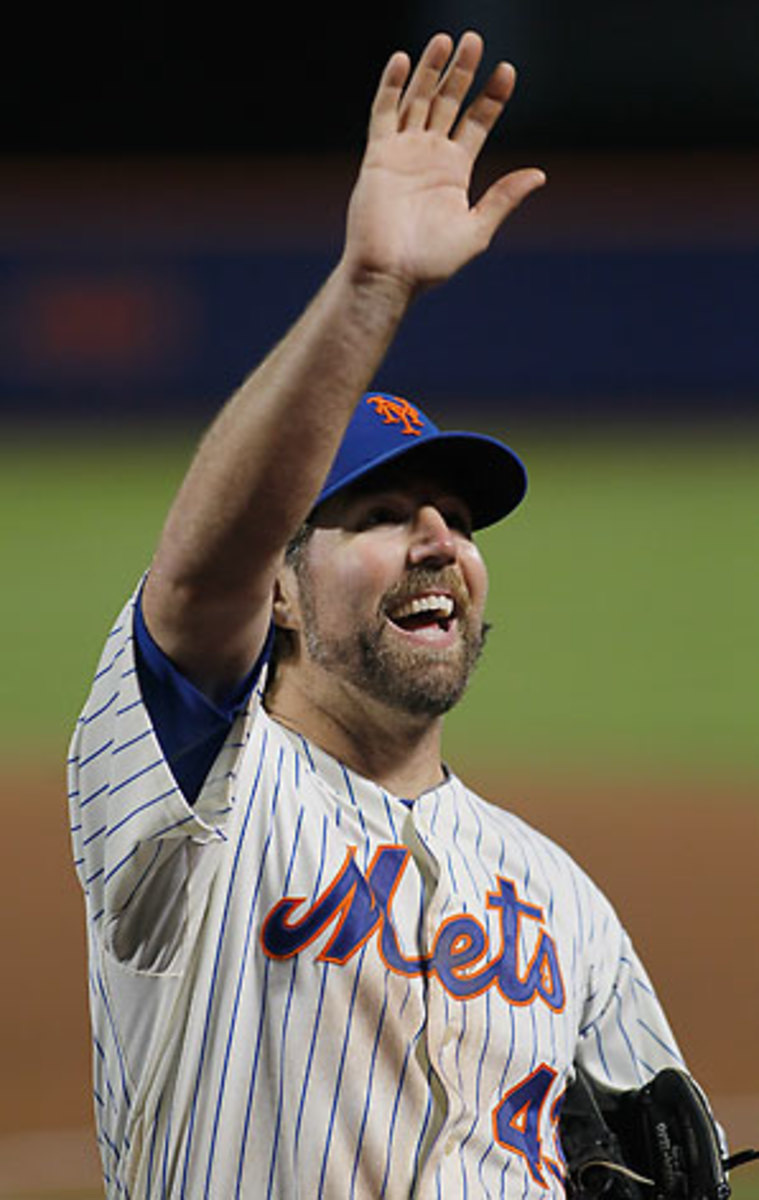
R.A. Dickey and his amazing knuckleball have been pure magic
Having recently summitted Mt. Kilimanjaro to raise awareness for international human sex trafficking -- not, suffice to say, most athletes' philanthropic cause of choice -- Dickey had arrived in Port St. Lucie, Fla., in peak physical condition at age 37. He was coming off the best season of his career. His knuckleball, "an inherently untrustworthy pitch" as he calls it, was moving as though he had sent it to obedience school.
But Dickey was about to release his book, Wherever I Wind Up, an exceptionally well-done meditation on baseball, as well as a bracingly honest travelogue of Dickey's unlikely journey to the majors. On this March weekend, apart from experiencing some of the fear familiar to all authors as "release date" approached, Dickey was worried about how his moonlighting would intersect with his day job. How would his teammates react to the book? What would his bosses think? And most of all, he wondered, if he happened to get off to a slow start -- if that pitch somehow betrayed him -- would he stand accused of putting his literary career before his baseball career?
EXCERPT: Wherever I Wind Up, by R.A. Dickey
Here we are in mid-June and, let's just say, that concern no longer exists. Dickey has been pure magic this season. After confounding the Orioles on Monday night, Dickey became the first pitcher in almost a quarter-century to throw back-to-back one-hitters. He hasn't allowed an earned run in 42 2/3 innings. In a dozen decisions, Dickey is 11-1 this season. Suddenly this pitcher -- deep into middle-age, a few years removed from being a career minor leaguer contemplating retirement -- is likely to start the All-Star game next month. "R.a.-dick-ulous," as the tabloid headline writers will inevitably call it. Victor Cruz, Tim Tebow and Jeremy Lin have competition for the most endearingly unlikely New York sports story.
JAFFE: Behind the numbers of Dickey's historic, out-of-nowhere start
Like so many, Mets manager Terry Collins shakes his head at Dickey's success. "The Koufaxes and the Seavers and those guys, the greats of the greats, the 97 mile-an-hour fastballs and great curveballs, the Goodens, the Verlanders," Collins told reporters last night. "This guy is just amazing with that pitch, just amazing."
Yes, that pitch. What makes Dickey's breakthrough season all the more enchanting is that mystical pitch, the one that salvaged his career when he wasn't making it as a conventional thrower. When the ball leaves Dickey's hand and heads toward home, it doesn't rotate and it travels slower than the cars on the Grand Central Parkway beyond the Citi Field fences. Yet when the knuckleball dives, batters are left cleaving at air. Watch Dickey pitch and you almost giggle at how hopelessly both the batter and his poor catcher, Josh Thole, flail away. (Bob Uecker joke: "How do you catch a knuckleball? Wait until it stops rolling and then pick it up.")
You also shudder imagining what would happen if one of today's Leviathan batters actually figured out the riddle and connected. This possibility is not lost on Dickey. "I've thrown a pitch as slow as 59 miles an hour to Vlad Guerrero and, yeah, you think, 'This sure can come off of my forehead at a high rate of speed.'"
Dickey is sport's ultimate outlier, which, of course, makes this story still sweeter. He is unapologetically thoughtful, literary and literate. His clubhouse locker doubles as a library; he's currently pondering writing a book of short stories. He is the rare ballplayer whose interviews are parsed on the vocabulary.com blog, whose voice gets thick with emotion when he discusses his love of words. With a full beard and an unruly head of hair, he even looks like a middle-aged English professor awaiting a tenure decision.
He is also the rare athlete who has a pleasant interaction with a member of the media and then thinks nothing of staying in contact. So it was that Dickey, whom I profiled in Sports Illustrated after speaking with him during training camp, and I chatted by phone the other day as he drove to the ballpark. (Dickey is sufficiently modest, both in taste and profile, that he sometimes takes the subway or Long Island Railroad to work, losing himself in a book; though how long can that anonymity continue, given recent events?) We talked about writing and books and our kids. We talked about Brian Baker, a tennis player from Dickey's hometown of Nashville, also making a late-career surge.
(Life being heavy into irony, it turns out Baker's mother teaches music to two of Dickey's children back home in Tennessee.) We steered clear of baseball. No reason to tempt fate and dwell on Dickey's startling success this season.
Like the knuckleball itself, who knows where this story is headed? Who knows when the plot will twist? But for now, what else can we do but happily follow along as the Mets' protagonist charts one of the more improbable narratives in sports?




